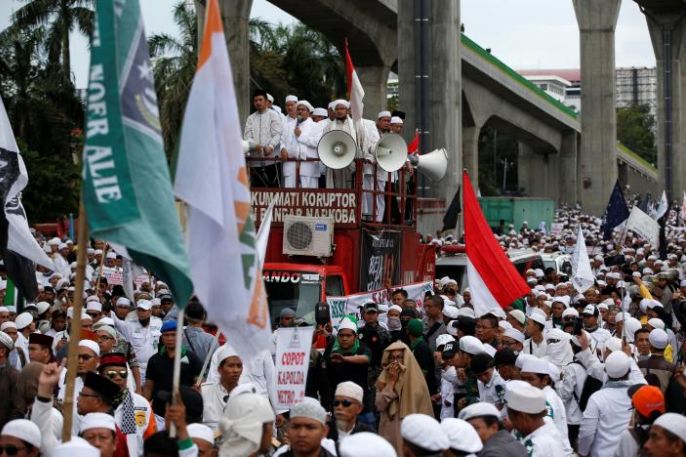After its official permit as a civil society organization (referred to in Indonesia as “mass organizations” or ormas for short) expired on June 20, the hardline Islamic Defenders Front (FPI) have been in something of a legal limbo. It appears that the group will remain in that state for the unforeseeable future, but will still be allowed to operate.
The Home Affairs Ministry yesterday said that FPI’s application for a new ormas permit has been delayed as it lacked several administrative requirements. The ministry said it would return the application to the hardline Islamic group within the week for revision and re-application.
“If they don’t have the permit that means they are not a legally recognized body,” Home Affairs Ministry Politics and General Governance Director General Soedarmo told CNN Indonesia.
Soedarmo said that the direct implication of FPI not having an ormas permit is that they are not entitled to any government grants until they’re legally recognized. However, he said that FPI would be allowed to remain active without the permit, with the caveat that it can only be referred to as a “gathering” or community rather than a civil society organization.
In response, FPI General Secretary Munarman said an ormas doesn’t need the government’s permission to exist and that the government has been “dumbing down” the public in this matter. He did not say whether or not FPI would submit a revised permit application to the Home Affairs Ministry.
The issue of FPI’s permit renewal was hotly discussed last month when an online petition was launched urging the Home Affairs Ministry to not extend the group’s ormas permit. That petition has over 485,000 signatures as of today, while a counter petition expressing support for FPI has 198,000 signatures.
Supporters of FPI frequently point to the militant group’s propensity for providing humanitarian aid to natural disaster victims and argue they were among the first to aid in relief efforts after the 2004 Aceh tsunami (we’d note that other organizations with questionable ethics, such as the Japanese Yakuza, also engage in similar disaster relief efforts).
However, critics of the hardline Islamist group maintain that FPI, above all, threatens religious tolerance in Indonesia through their radical actions such as carrying out violent vigilante raids on minorities, threatening Lady Gaga into canceling her Jakarta concert and leading the protest movement against former Jakarta Governor Basuki “Ahok” Tjahaja Purnama that led to his imprisonment — the last of which saw the group gain far greater clout and political influence in recent years.
Were FPI to ultimately be disbanded by the government, it wouldn’t be the first time a hardline Islamist organization was dissolved under President Joko Widodo’s administration. In 2017, the president’s administration unilaterally banned the radical group Hizbut Tahrir Indonesia (HTI), arguing that doing so was necessary to maintain the country’s security and pluralist ideologies — particularly as HTI’s aim was to establish an Islamic caliphate and the organization had been linked to numerous terrorist attacks throughout Indonesia, including the 2002 Bali bombings and the 2016 bomb attack in Jakarta.




